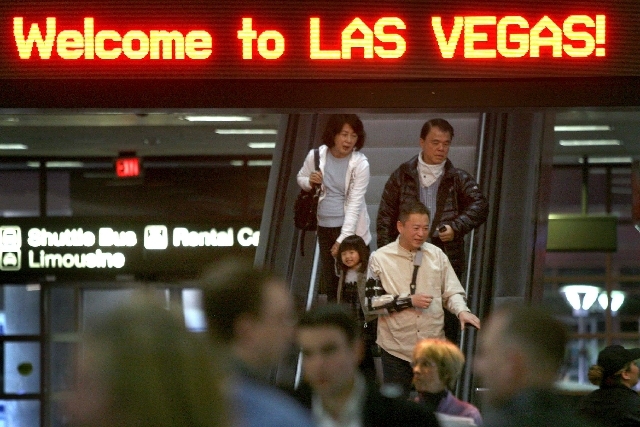Airline schedules for second half of ’13 hint at tourism boost
The all-important visitor industry could get a much-needed boost in the second half of this year with airlines booking larger jets on their flights into Las Vegas.
Schedules compiled by the travel data firm Innovata show 2.7 percent more seats on planes landing at McCarran International Airport through December, even though the flight count will drop 1.2 percent.
Market leader Southwest, for example, will continue its recent pattern of cutting the number of arrivals but offsetting that by squeezing six more seats on each of its older planes and bringing in a larger, newer model of its mainstay Boeing 737.
The outlook published by McCarran management also shows the domestic airlines posting capacity gains as international carriers cut back, a reverse of the trend going back to last year. McCarran’s numbers go only until October because of concerns that accuracy diminishes with longer projections, but they vary from Innovata only by a fraction of 1 percent.
“We are cautiously optimistic that things are looking up,” said McCarran spokeswoman Christine Crews.
However, she noted, the accuracy of the schedules decreases going further into the future as airlines change planes and drop or add flights.
The growing activity at McCarran comes as the visitor industry in general has stagnated in recent months in tandem with air traffic, in keeping with the close tie between the two.
With McCarran passenger totals down 1.1 percent in the first four months of this year, the overall visitor count dipped 0.3 percent. The key benchmarks of the number of nights each hotel room was occupied slipped 0.6 percent, while the average rates went up just 2.9 percent, according to Las Vegas Convention and Visitors Authority reports.
By contrast, the McCarran passenger count went up 3.9 percent in 2011, helping to raise the visitor total by 4.3 percent, room rates by 10.7 percent and room nights by 5.3 percent.
The numbers come on top of the authority’s annual surveys that have consistently shown that people who fly to Las Vegas stay longer and spend more than those who arrive by car.
But it is an open question how much fresh blood the 2.7 percent seat gain will pump into the Las Vegas economy.
“Any percentage increase is going to help,” said Andrew Klebanow, a principal at the Las Vegas-based Gaming Market Advisors. “But will it be significant? Probably not.”
Klebanow believes that more flights would create a greater boost than putting more seats on the planes already coming here by giving potential visitors wider travel options. However, he said, the airlines have continued their strategy of capacity discipline, which involves keeping a tight rein on schedules to push up fares.
As a result, he said, reaching Las Vegas has become notably more expensive in the past couple of years, a difficult hurdle for a leisure destination to overcome even with continued visitor interest.
“What we really need is for Southwest to grow,” Klebanow said.
A major factor in the beefier flight schedules in the second half has been revived interest by the three major network airlines that rank among McCarran’s top five: American, Delta and United. American’s seat count will rise 9.6 percent as it nears the end of its Chapter 11 bankruptcy and a proposed merger with a US Airways that is still shrinking locally. Delta will go up 8.4 percent and United 1.7 percent, an improvement on the recent past for both.
International schedules will be affected by three airlines — Mexico’s VivaAerobus, Air Berlin and Philippine Airlines — pulling out of the market completely.
In addition, Virgin Atlantic, which long had a monopoly on nonstop flights to the United Kingdom, will drop its capacity 7.6 percent as archrival British Airways adds 26.9 percent.
Contact reporter Tim O’Reiley at toreiley@reviewjournal.com or 702-387-5290.






















